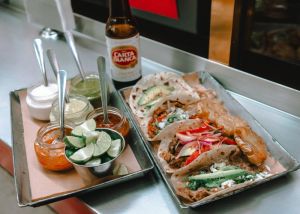 How’s your relationship with food? Do you starve yourself all day and then binge at night, eat in private because you are “on a diet” or skip meals and pick at snack foods all day? Do you turn to fatty, sugary junk food when you’ve had a bad day or does thinking about food and what you’re going to eat take up a significant chunk of time in your day?
How’s your relationship with food? Do you starve yourself all day and then binge at night, eat in private because you are “on a diet” or skip meals and pick at snack foods all day? Do you turn to fatty, sugary junk food when you’ve had a bad day or does thinking about food and what you’re going to eat take up a significant chunk of time in your day?
Binge eating disorder will affect one in fifty of us in our lifetime, it is the most common but least understood eating disorder. Beat, a UK eating disorder charity, is using Eating Disorders Awareness Week to let people know that it’s not about being greedy or lacking in willpower. Binge eating can be a serious mental illness which many suffer with alone. It’s common for sufferers to struggle with the stigma and fear of how others might react, which prevents them from asking for help.
Over the course of the last year, most of us have noticed our eating habits changing. Last year sales of bars of chocolate from the supermarket rose a whopping 46% year on year in the UK as people turned towards chocolate and other cheap treats to help self-soothe and provide comfort. Lockdown has ratcheted up the pressure on people with Eating Disorders. That’s no surprise. Isolation is fertile ground to an ED.
It’s important to know that struggles with food don’t just happen to those who are over or underweight, it is possible to be at a healthy weight and have issues with the way that you view food. Increased levels of stress and anxiety affect people in different ways, with some turning to restricting their food to feel in control while others have begun to binge eat, often as an attempt to comfort or stuff feelings down.
A habit of relying on food, or control thereof, to change your mood often backfires with people reporting that they feel guilt, shame or self-loathing if their actions don’t match their plans. Some people even report they resort to self-harming after eating. Our cultural norms of dieting have been found to lead to increased risks of developing disordered eating patterns such as fasting, binge eating, intentional vomiting, laxative use and cutting out whole food groups.
Hypnotherapy is well known for weight loss, but it’s also useful to help learn about why you’re binging, or why you’re restricting your food. The National Council for Hypnotherapy (NCH) says that hypnotherapy can teach you new and more productive ways of managing stress, uncertainty and anxiety, meaning you’re less likely to look for external factors like food to help you feel in control.
Working together with your hypnotherapist you will develop new habits and coping mechanisms that aren’t based on food, focusing on making healthy changes to your diet and lifestyle that will remain with you for the rest of your life. Are you ready to give up the battle?
Why not contact a hypnotherapist near you? Simply use the NCH directory by clicking here.
Photo by Hana Brannigan from Pexels
